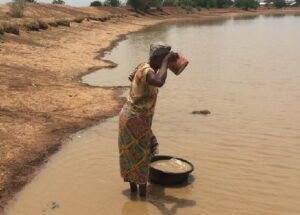Indiscipline, human activities said to be moving Ghana to state of water scarcity
 Professor Emmanuel Frimpong, a visiting Professor of the Virginia Polytechnic Institute and State University, United States of America has observed that Ghana is gradually moving into water scarcity because of indiscipline human activities.
Professor Emmanuel Frimpong, a visiting Professor of the Virginia Polytechnic Institute and State University, United States of America has observed that Ghana is gradually moving into water scarcity because of indiscipline human activities.
He said though the nation used to have enough water bodies, deterioration of water resources these days due to recklessness by some people was seriously affecting water quality and aquaculture.
“There can`t be food security without water security,” Prof. Frimpong stated, adding that, “the average Ghanaian consumes between 25 to 30 kilogramme of fish in a year and has caused high demand for fish in the country while there are numerous water resources for fish production.”
Prof. Frimpong was speaking on the topic “The Path to Food Security” at a symposium on the theme “Building Food Security on Homegrown Food and Renewable Energy Technologies: The Role of Fisheries and Water Resources” organised by the Department of Fisheries and Water Resources, University of Energy and Natural Resources (UENR) in Sunyani.
The one-day symposium aimed at provoking discussion on the sustainability of quality water resources as a key component through which food security could be achieved for the attainment of the Goal Two of the United Nations Sustainable Development Goals (SDGs).
It was attended by students of the university, local fish farmers’ association representatives, agricultural and water resources experts and the Sunyani Office staff of the Fisheries Commission.
Prof. Frimpong therefore called for partnership between government, academia, technocrats and the law enforcement agencies to work rigorously towards protection and sustainability of clean water resources for agriculture and aquaculture enhancement.
According to him, Ghana was not doing well in utilising its resources in producing what the nation consumed, hence the need to have a sustainable way of production to meet demand of the population and reduce cost on importation of food items, particularly fish.
Dr. Seyramsarah Setufe, the acting Head, Department of Fisheries and Water Resources, UENR, said the event was to discuss the crucial need for Ghana to ensure protection and sustainability of water resources and the use of renewable energy technologies to improve food production.
She noted Ghana had the potential to produce all it could consume, saying policy formulators must therefore direct their discussions and activities towards the path to greatly improve ‘homegrown’ food for food security and reduce importation.
Dr. Anthony Duah, a research scientist at the Council for Scientific and Industrial Research (CSIR) said the government had put in a lot of measures and policies to ensure food security, but the attitude of the citizenry was a challenge.
He therefore emphasised the need for environmental best practices and proper waste and water management system for enough quality water to produce the needed amount of food in the country.
Source: GNA
